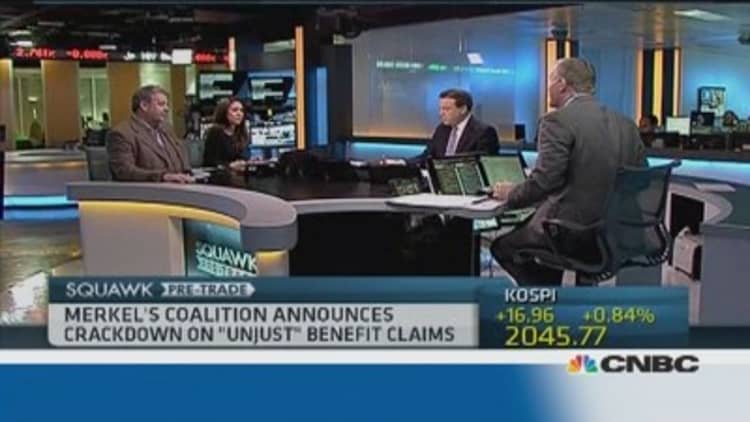
One of the founding ideas behind the European Union is that there should be free movement for workers between its countries. But the prospect of immigration westwards from the EU's new eastern members, Romania and Bulgaria, has pushed governments from the area's three biggest economies to signal they want to put up new barriers.
The moves by France Germany and the U.K. reflect worries that immigration from the ex-Eastern Bloc countries to more developed EU economies could put pressure on other member countries' labor forces and welfare systems.
This means that a key EU meeting on the eastern European states on Thursday may be fractious. José Manuel Barroso, the European Commission president, pointed out this week that the freedom to move and work around the EU this is "one of the most valued principles by the EU citizens."
(Read more: What's killing Croatia's EU party)
In an attempt to quell concerns that people from Bulgaria and Romania will move to the U.K. to claim welfare once temporary controls are lifted at the end of the year, Prime Minister David Cameron pledged to cut unemployment benefits for migrants and called for new rules to stop "vast migrations" in an article in the Financial Times. This was seen by many as a return to his party's previous anti-immigration stance.
There has been increasing discontent from within Cameron's Conservative Party over apparent gains from anti-EU party U.K. Independence Party in the polls. Groups like MigrationWatch UK have raise concerns about immigrants costing taxpayers money by claiming benefits and using the country's free health and education systems.
Cameron's German counterpart, Angela Merkel, also announced a plan to limit social security benefit for migrants as part of her new coalition government. And in France, the government announced a crackdown on abuse of benefits by immigrant workers, branding this "a threat to the economic and social fabric of France."
(Read more: Poland: A tough sell?)
This may just be political posturing, as the evidence suggests most economic migrants from the EU are there to work. Immigrants from the European Economic Area (the EU, Norway, Iceland and Liechenstein), have paid 34 percent more in taxes than they received in benefits since 2000, according to a recent study by University College London. They are more likely to have a university degree and less likely to receive state benefits than those born and bred in the UK, according to the UCL report.
(Read more: Immigration rules to (gradually) change)
"Historically this has been the success of the UK. We have taken in successive waves of immigrants and the country is economically better for it," Bill Blain, senior fixed income broker at Mint Partners, told CNBC.
The UK government famously underestimated the number of workers, who would come to the country from Poland and the other Eastern European countries following their 2004 EU accession by a huge factor. They thought between 5-13,000 workers would come annually, whereas that figure was closer to 500,000 in the first couple of years post-accession.
Current estimates are that 12,700 Romanians and Bulgarians will settle in the UK in 2014, but Eric Pickles, the communities minister, has said it is extremely unpredictable. The UK is particularly attractive because many of the former Eastern European migrants speak English as their second language.
- By Catherine Boyle, CNBC. Twitter: @cboylecnbc.


